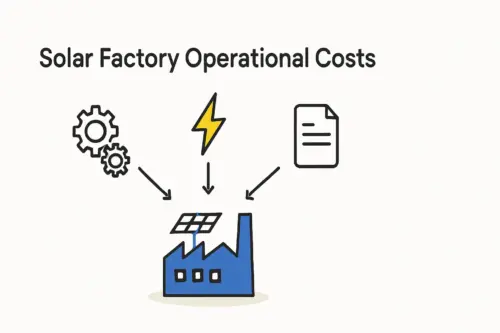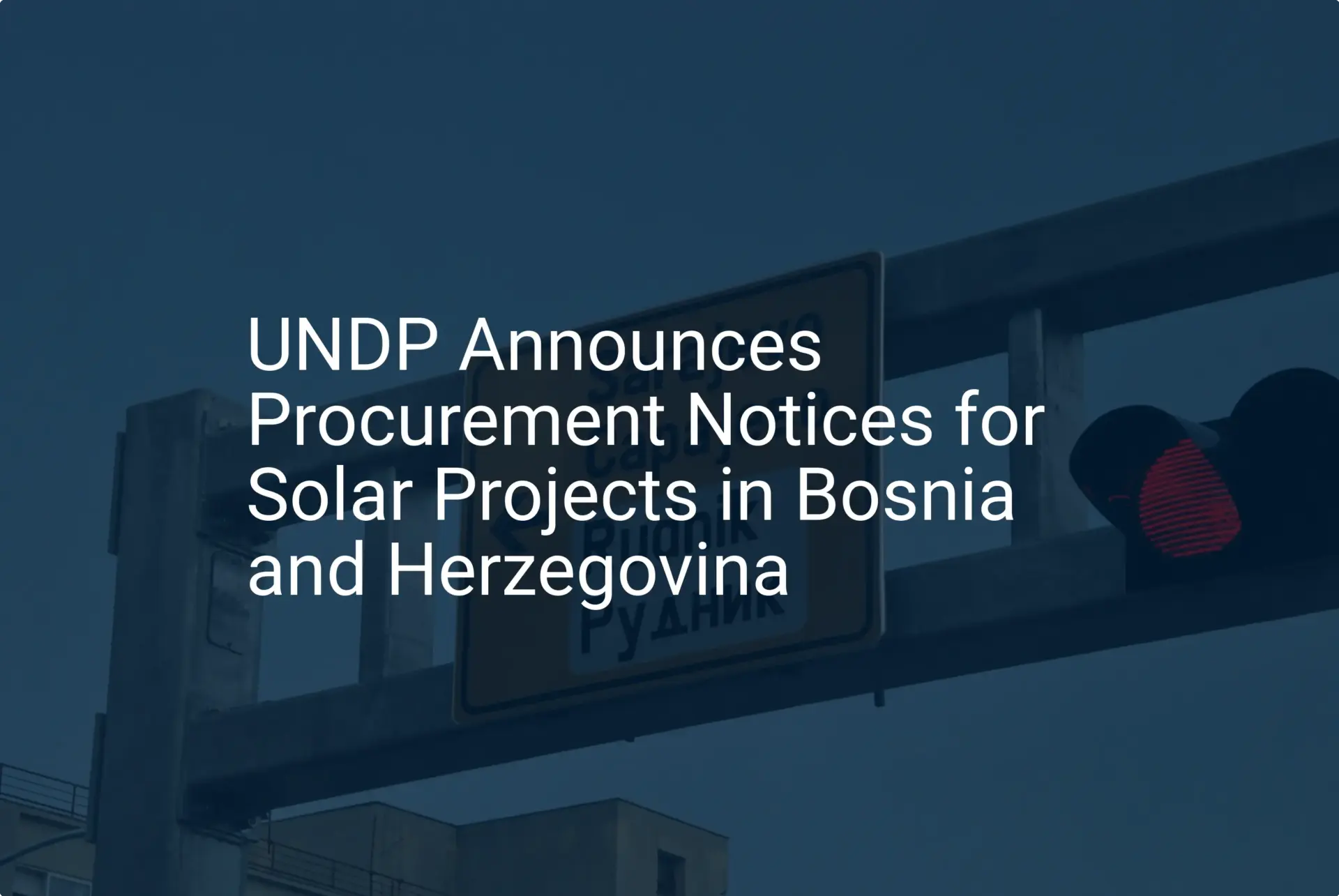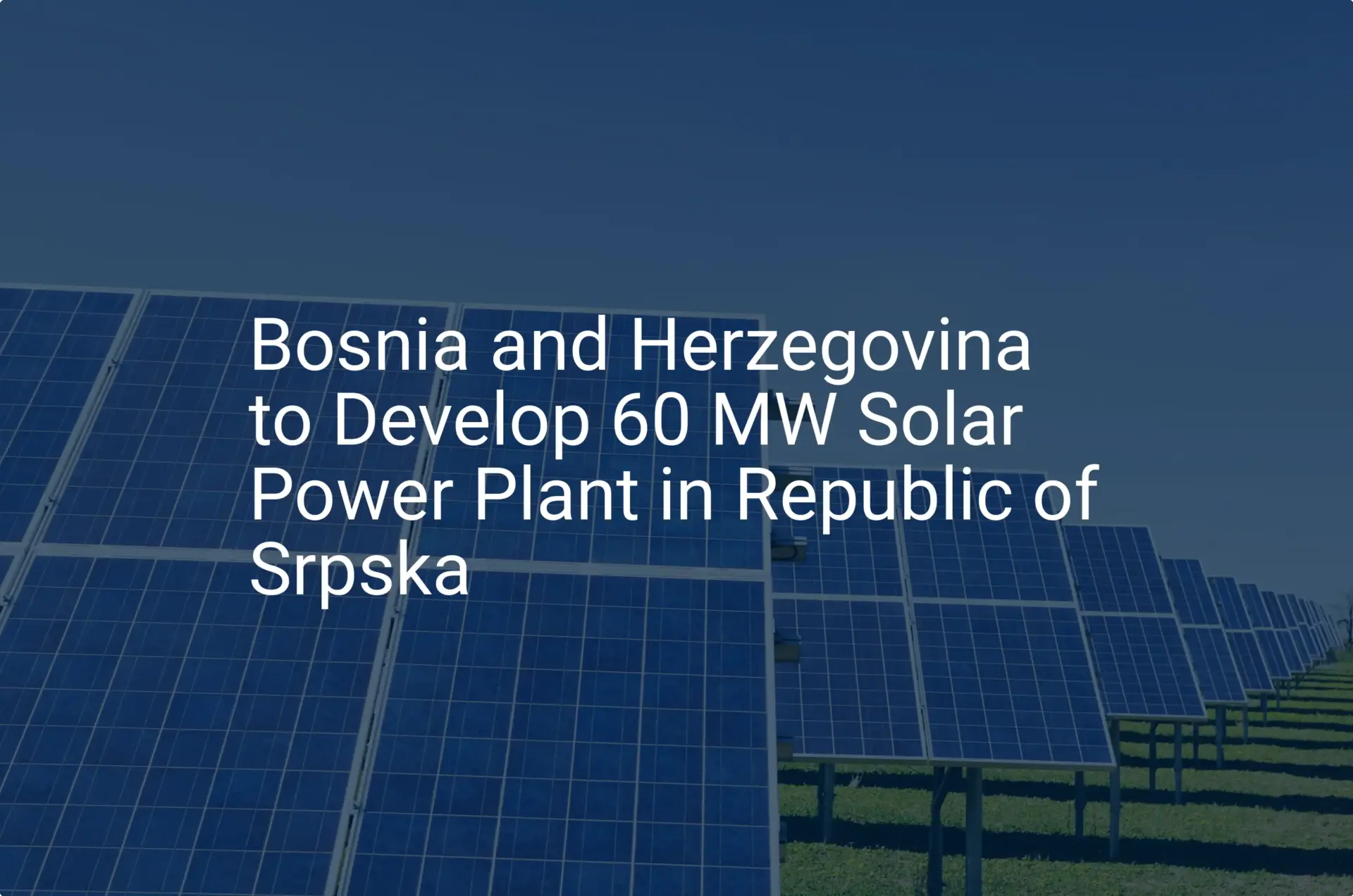An investor eyeing Bosnia and Herzegovina for a new solar module factory sees a compelling business case: a strategic position in Southeast Europe, access to skilled labor, and growing government support for renewable energy.
Yet, initial site visits and discussions reveal an unexpected complexity. The most critical decision isn’t about technology or logistics, but whether the proposed site is in Sarajevo or Banja Luka. This choice matters because the country operates under two distinct legal and administrative systems—a reality that can determine an investment’s success or failure.
This guide breaks down the dual regulatory landscape of Bosnia and Herzegovina, focusing on the practical differences an investor will face when securing manufacturing permits in its two primary entities: the Federation of Bosnia and Herzegovina (FBiH) and Republika Srpska (RS). Understanding these distinctions is the essential first step toward a successful factory setup.
Table of Contents
Understanding the Two-Entity System: FBiH and Republika Srpska
Bosnia and Herzegovina’s political structure is unique. The state consists of two entities, the Federation of BiH and Republika Srpska, as well as the self-governing Brčko District. For an industrial investor, this is not merely an administrative detail; it means navigating two separate sets of laws, government bodies, and bureaucratic procedures.
A factory in FBiH is subject to a legal framework entirely different from one in RS, even if they are only a few kilometers apart. This division impacts everything from land acquisition and zoning to construction permits and environmental approvals. Investors must approach their project knowing they are effectively operating within one of two distinct regulatory jurisdictions.
The Permitting Pathway in the Federation of BiH (FBiH)
In the Federation of BiH, the permitting process is highly decentralized. Power is distributed among the entity level, ten cantons, and numerous municipalities, creating a multi-layered system that requires careful navigation.
Key Authorities and Permits
- Cantonal Ministries: Each of the ten cantons has its own ministry responsible for spatial planning and construction, often with slightly different interpretations of federal law.
- Municipal Departments: The local municipality is the primary point of contact for submitting applications and receiving initial approvals.
The typical permitting sequence involves three main stages:
- Location Permit (Urbanistička saglasnost): This document confirms the proposed project complies with municipal spatial and zoning plans. It is a prerequisite for the construction permit.
- Construction Permit (Građevinska dozvola): The core permit authorizing the start of construction. It requires detailed technical documentation, proof of land ownership, and compliance with all relevant building and safety codes.
- Use Permit (Upotrebna dozvola): Issued after construction is complete and a technical inspection confirms the facility was built according to approved plans and is safe for operation.
The primary challenge for investors in FBiH is managing the varying requirements and timelines across different cantons and municipalities. A strategy that works in one canton may need significant adjustment in another.
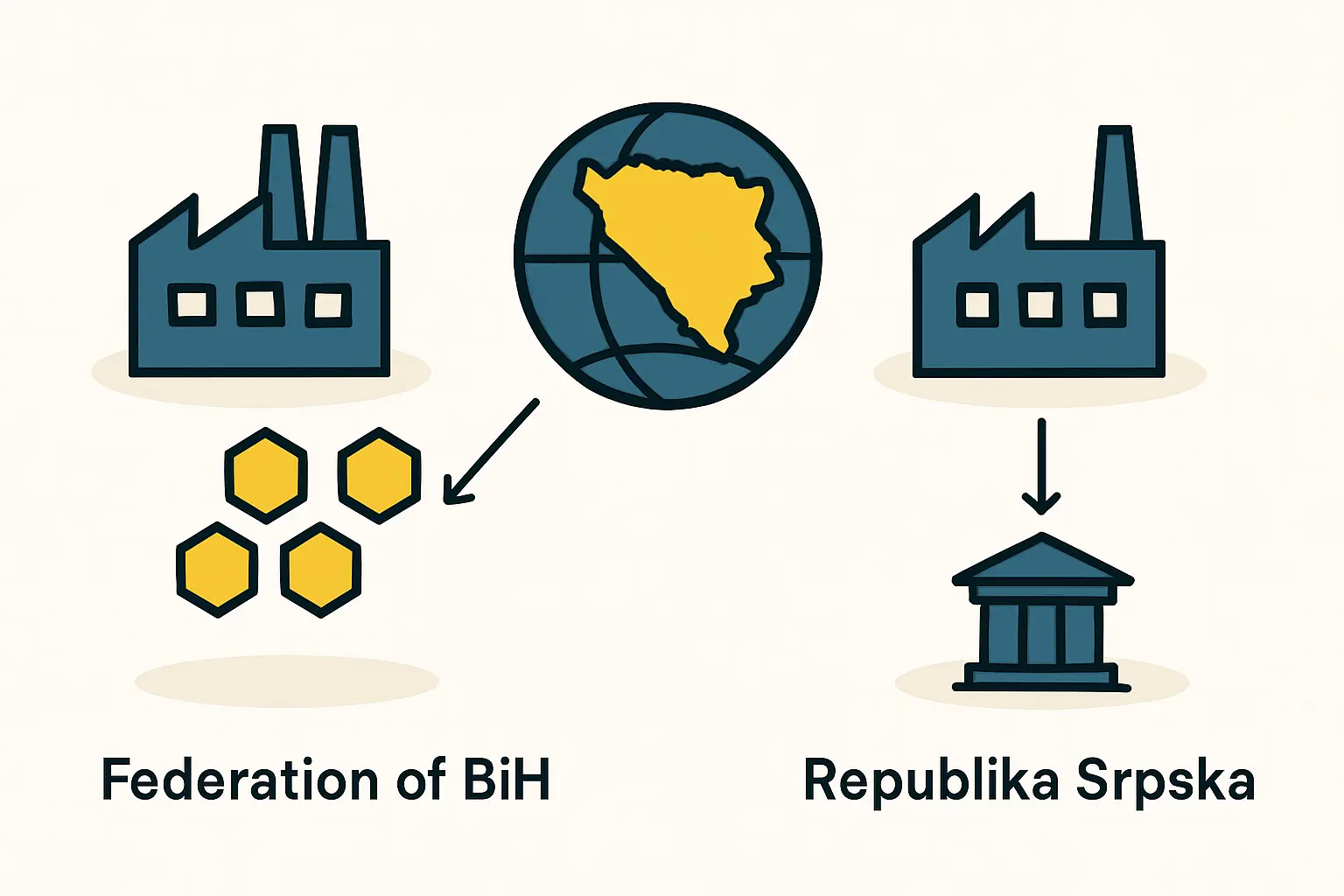
The Permitting Pathway in Republika Srpska (RS)
In contrast to FBiH, the permitting process in Republika Srpska is more centralized. While municipalities still play a crucial role, the entity-level ministry retains significant authority, creating a more uniform—though still complex—procedure.
Ready to make big Profits?
The solar Industry is Booming
WE HELP NEWCOMERS to the solar industry start their own solar module production line. Customers can make BIG PROFITS by selling modules and finding investors, without wasting money and time on things they don't need!
Key Authorities and Permits
- RS Ministry for Spatial Planning, Civil Engineering, and Ecology: This central body oversees the entire process, ensuring compliance with the entity’s laws, such as the Law on Spatial Planning and Construction.
- Municipal Departments: As in FBiH, local municipal offices process applications and issue certain approvals under the ministry’s oversight.
The permit stages are analogous to those in FBiH:
- Location Conditions (Lokacijski uslovi): The RS equivalent of the location permit, defining the parameters for construction on a specific parcel of land.
- Construction Permit (Građevinska dozvola): Authorizes construction once technical documentation is approved and all prerequisites are met.
- Use Permit (Upotrebna dozvola): Final approval granted after a successful technical inspection of the completed factory.
RS has also made efforts to digitize the process through its “e-građevinska dozvola” initiative. While implementation is ongoing, it signals a move toward greater transparency and efficiency.
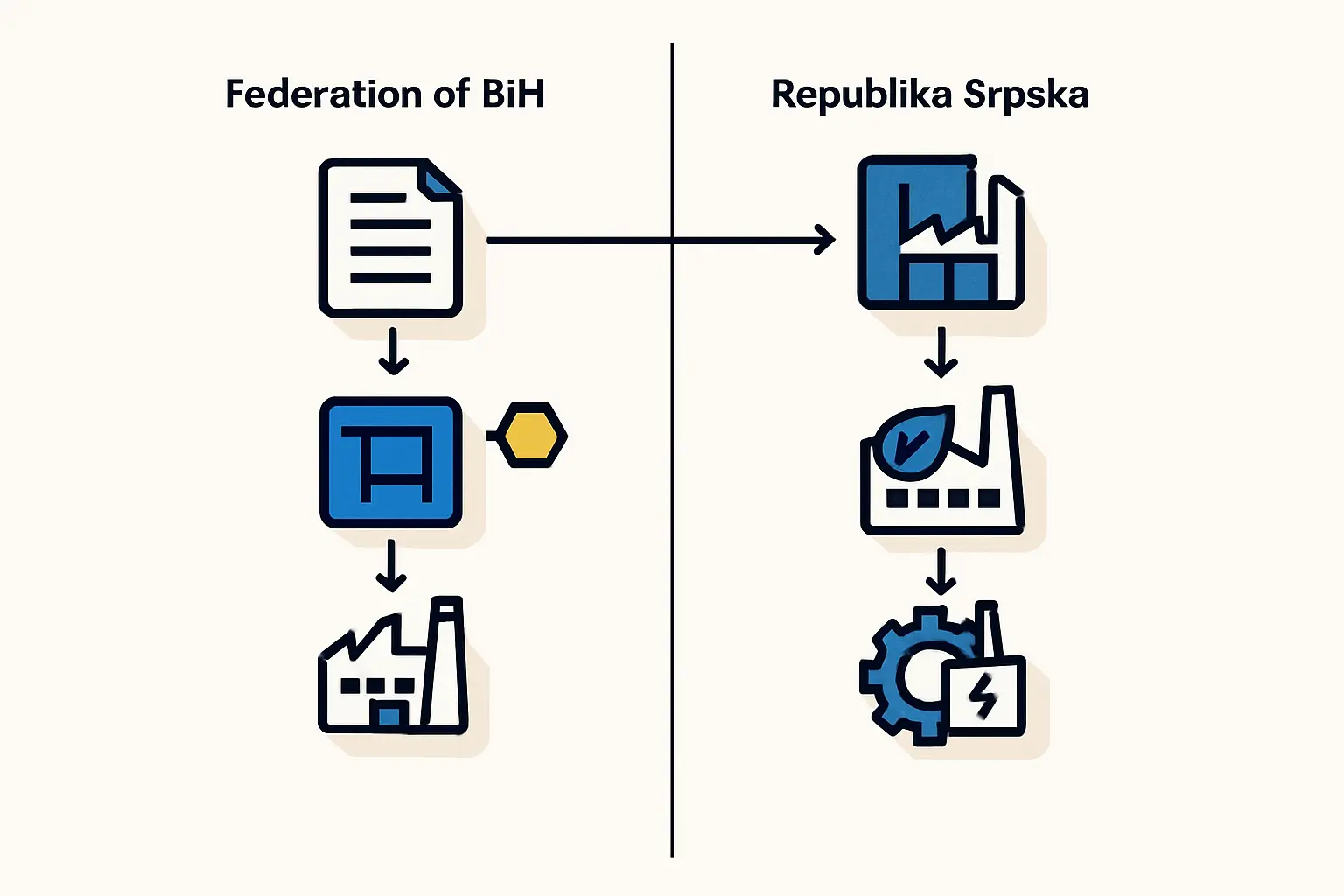
Key Differences and Strategic Considerations for Investors
Choosing between FBiH and RS for a factory location involves a strategic trade-off. There is no universally “better” option; the ideal choice depends on the specific project and the investor’s priorities.
Centralization vs. Decentralization
The centralized RS system can offer more predictability, as regulations are applied more uniformly across the entity. The decentralized FBiH system, however, may provide more flexibility at the local level if strong relationships are built with cantonal and municipal authorities.
Timelines and Bureaucracy
Bureaucratic delays are a risk in both entities. In FBiH, delays can arise from poor coordination between cantonal and municipal bodies, while in RS, bottlenecks may occur at the central ministry level. Diligent follow-up and the assistance of local experts are essential for keeping the process on track. A thorough plan for legal and consultancy fees is also critical from the outset.
The Importance of Local Expertise
Engaging legal and technical consultants with specific, demonstrable experience within the chosen entity is non-negotiable. An expert in FBiH’s cantonal system may not be equipped to navigate the ministerial processes in RS, and vice versa. This local knowledge is one of the most critical investments a project can make.
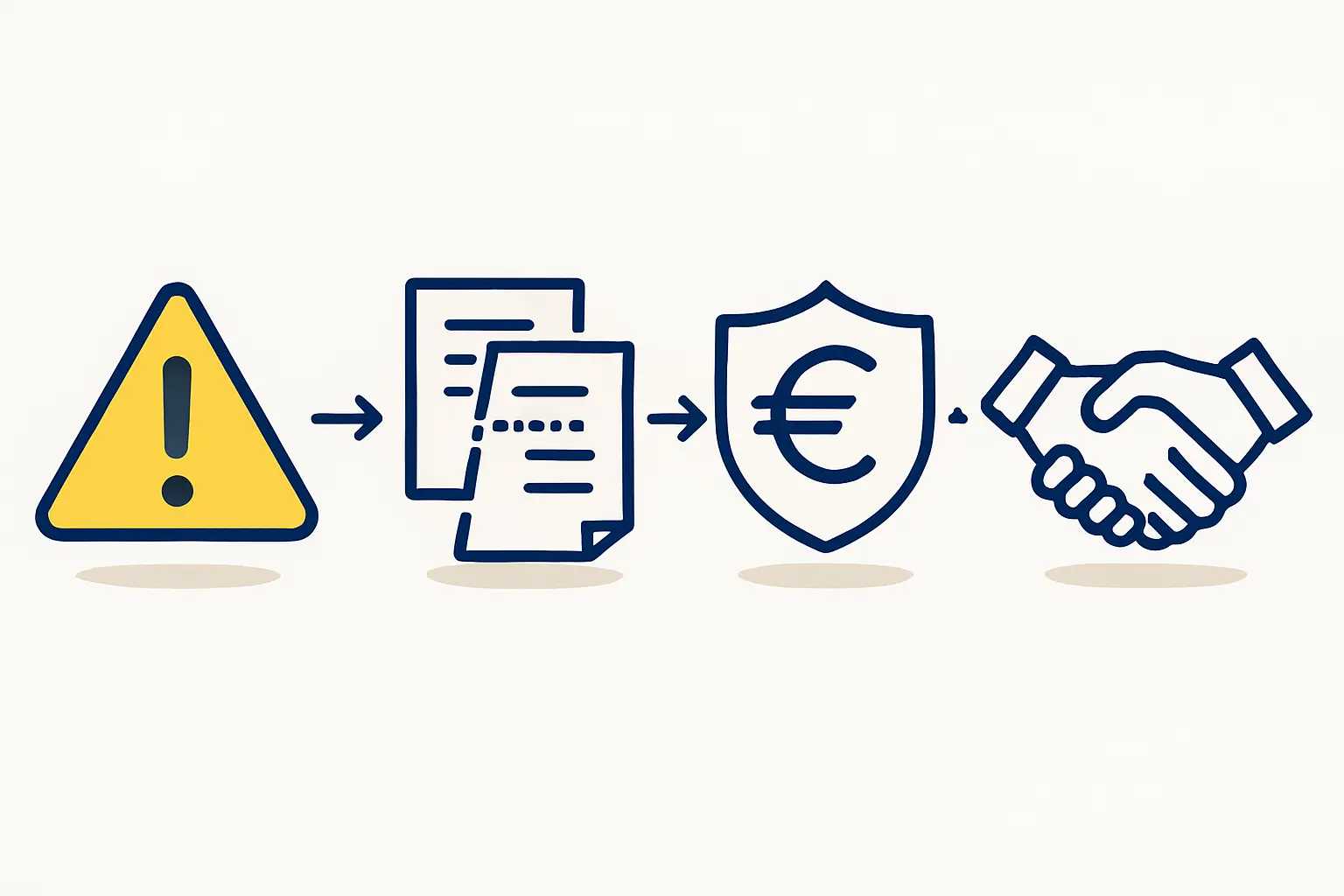
Due Diligence: The Non-Negotiable First Step
Before any permit applications are filed, rigorous due diligence is essential. Experience from J.v.G. turnkey projects shows that overlooking issues at this stage is one of the costliest early-stage mistakes an investor can make.
Key areas for investigation include:
- Zoning and Land Use: Verify that the prospective land is zoned for industrial use in the official municipal spatial plans.
- Land Ownership: The land registry system can be complex. A thorough title search is necessary to confirm clear ownership and ensure there are no unresolved claims.
- Infrastructure Access: Secure preliminary agreements and assess the feasibility of connecting to the electrical grid, water supply, and road networks. These connection requirements are also entity-specific. For example, available grid capacity might influence the selection of solar module manufacturing equipment to ensure the factory’s power demands can be met.
Frequently Asked Questions (FAQ)
Q: Which entity is “better” for setting up a solar factory?
A: There is no single “better” choice. The decision depends on factors like specific site location, logistical advantages, available incentives, and the local business environment. Some investors may prefer the consistency of the RS system, while others may find opportunities within the decentralized FBiH structure. A detailed feasibility study is essential for making an informed decision.
Q: How long does the entire permitting process typically take?
A: While timelines can vary significantly, investors should realistically budget for 6 to 18 months to complete the entire permitting cycle, from initial application to receiving the final Use Permit. This estimate depends on the project’s complexity and the efficiency of the local administration.
Q: Can a foreign company own land directly in BiH?
A: Yes, foreign legal entities can own property in Bosnia and Herzegovina, generally based on the principle of reciprocity with their country of origin. The process for registering ownership is detailed and requires careful legal guidance to ensure compliance with entity-specific laws.
Q: What are the main building requirements I need to be aware of?
A: Beyond standard industrial building codes, investors must also consider specific local regulations. The initial architectural and engineering plan should include a detailed overview of the requirements for a solar factory building, covering all structural, safety, and environmental standards.
Q: Are there any “one-stop-shop” agencies for foreign investors?
A: The Foreign Investment Promotion Agency of Bosnia and Herzegovina (FIPA) serves as a key facilitator for foreign investors. While FIPA provides valuable support, information, and connections, it does not issue permits. The formal application and approval process must still be conducted with the relevant authorities in either FBiH or RS.
Conclusion:
Successfully establishing a solar module factory in Bosnia and Herzegovina is an achievable goal for a well-prepared investor. The key is to recognize the country’s dual regulatory system not as an obstacle, but as a fundamental feature of the business environment. By conducting thorough due diligence and engaging specialized local experts, entrepreneurs can confidently navigate the complexities of either entity and build a successful manufacturing operation.



